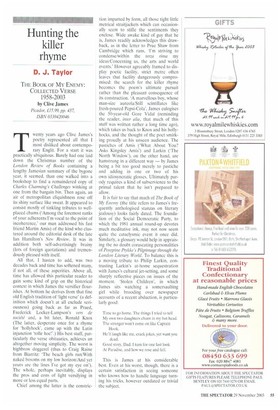Hunting the killer rhyme
D. J. Taylor
THE BOOK OF MY ENEMY: COLLECTED VERSE
1958-2003 by Clive James
Picador, £15.99, pp. 437, ISBN 0330420046
Twenty years ago Clive James's poetry represented all that I most disliked about contemporary Englit. For a start it was practically ubiquitous. Barely had one laid down the Christmas number of the London Review of Books containing a lengthy Jamesian summary of the bygone year, it seemed, than one walked into a bookshop to find a remaindered copy of Charles Charming's Challenges winking at one from the bargain bin. Then again, an air of metropolitan cliquishness rose off its shiny surface like sweat. It appeared to consist mostly of tinkling tributes to wellplaced chums (`Among the foremost ranks of your adherents/I'm vocal to the point of incoherence.' our man addressed his fast friend Martin Amis) of the kind who clustered around the editorial desk of the late Ian Hamilton's New Review. It was in addition both self-advertisingly brainy (lots of foreign quotations) and tremendously pleased with itself.
All that. I hasten to add, was two decades back and time has softened many, if not all, of these asperities. Above all, time has allowed this particular reader to gain some kind of grip on the historical context in which James the -versifier flourishes. At bottom he derives from that fine old English tradition of 'light verse' (a definition which doesn't at all exclude seriousness) going back as far as Praed, Frederick Locker-Lampson's vers de societe and, a bit later, Ronald Knox (The latter, desperate once for a rhyme for 'hollyhock', came up with the Latin injunction 'toile hoe.) His best stuff, particularly the verse obituaries, achieves an altogether moving simplicity. The worst is highbrow doggerel (thus to Craig Raine from Biarritz: 'The beach girls run/With naked bosoms on my low horizon/And yet yours are the lines I've got my eye on'). The whole, perhaps inevitably, displays the pros and cons of light versifying in more or less equal parts.
Chief among the latter is the constric
tion imparted by form, all those tight little metrical straitjackets which can occasionally seem to stifle the sentiments they enclose. Wide awake kind of guy that he is, James readily acknowledges this drawback, as in the letter to Prue Shaw from Cambridge which runs, 'I'm striving to condense/within the terza rima my ideas/Concerning us, the arts and world events.' However agreeably framed to display poetic facility, strict metre often leaves that facility dangerously compromised: the search for the killer rhyme becomes the poem's ultimate pursuit rather than the pleasant consequence of its construction. 'A marvellous boy, whose man-size aureola/Still scintillates like fresh-poured Pepsi-Cola', James eulogises the 50-year-old Gore Vidal (reminding the reader, inter alia, that much of this stuff was written rather a long time ago), which takes us back to Knox and his hollyhocks, and the thought of the poet smirking proudly at his unseen audience. The pastiches of Amis ('What About You? Asks Kingsley Amis') and Larkin (`The North Window'), on the other hand, are hamstrung in a different way — by James being a bit too good merely to pastiche and adding in one or two of his own idiosyncratic glosses. Ultimately parody requires a kind of subservience to the primal talent that he isn't prepared to allow.
It is fair to say that much of The Book of My Enemy (the title refers to James's frequently anthologised stanzas on literary jealousy) looks fairly dated. The foundation of the Social Democratic Party, to which the 1981 annual round-up devotes much meditative ink, may not now seem quite the cataclysmic event it once did. Similarly, a glossary would help in appraising the no doubt coruscating personalities of Peregrine Ptykke's Pilgrimage through the London Literary World. To balance this is a moving tribute to Philip Larkin, contrasting Larkin's at-home sequestration with James's cultural jet-setting, and some sharply reflective pieces on issues of the moment. 'Stolen Children', in which James sits watching a somersaulting girl while brooding over newspaper accounts of a recent abduction, is particularly good: Time to go home. The things I tried to tell My own two daughters churn in my hot head. The stranger won't come on like Captain Hook.
He'll laugh like me, crack jokes, yet want you dead.
Good story. Dad. I turn for one last look At Paradise, and how we rose and fell.
This is James at his considerable best. Even at his worst, though, there is a certain satisfaction in seeing someone who knows how to handle language turning his tricks, however outdated or trivial the subject.


























































































 Previous page
Previous page